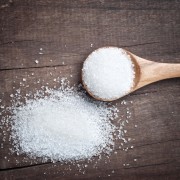The works of UK’s sugar tax
The works of UK’s sugar tax

A levy on soft drinks with more than 5g of sugar per 100ml will be imposed. A higher rate will be imposed for drinks with more than 8g per 100ml, according to the volume of the sugar-sweetened drinks they produce or import.
It is suggested by the Office for Budgetary Responsibility that the drinks be levied at 18p and 24p per litre.
The levy is directed at drinks that are high in sugar, particularly sodas, which are more popular among teenagers. Pure fruit juices and milk-based drinks are exempt.
Examples of drinks which would currently fall under the higher rate of the sugar tax include full-strength Coca-Cola and Pepsi, Lucozade Energy and Irn-Bru, the Treasury said. The lower rate would catch drinks such as Dr Pepper, Fanta, Sprite, Schweppes Indian tonic water and alcohol-free shandy.
Most of the drinks are incredibly high in sugar; a typical can containing about nine teaspoons, immediately taking someone over their recommended sugar intake all at once. Other than being “empty calories” for its lack of nutritional benefit, sugary drinks are the number one source of sugar intake of teenagers.
The campaign has been avidly supported by many people, putting forward a vociferous case for why a sugar levy is instrumental in the fight against childhood obesity in the UK.
Examples of high-profile supporters include TV chef Jamie Oliver who started a sugar levy in his restaurants and has 150,000 people backing his e-petition, and NHS England chief executive Simon Stevens who advocates the tax by announcing that health service will be introducing its own “tax” in hospitals.
The estimated £520m earned a year from the taxes will be spent on increasing the funding for sport in primary schools, says Chancellor Osborne. Research has shown that half of seven-year-olds do not do enough exercise. One in 10 children in England is obese at the beginning of primary school, and yet by the end of it, the proportion increases from one in five.
Although there are signs that obesity rates may be starting to plateau, there are still fears this could rise even further. The World Health Organization has described this issue as one of the most serious public health challenges for the 21st century, while NHS England's Simon Stevens has dubbed it "the new smoking".
Related Articles
Why oats and coeliac disease don’t mix
Study examines toxicity of oats for coeliac patients
Read moreWHO recommends reducing daily sugar intake by half
Limiting sugar consumption may help tackle obesity, says World Health Organization (WHO)
Read moreLatest Articles
Medical Care
Achieving Swift Recovery: Enhanced Recovery (ERAS) Direct Anterior Approach Total Hip Replacement
Consider total hip replacement with Alps Orthopaedic Centre's ERAS Direct Anterior Approach for faster recovery and reduced hospital stays. Learn about Dr. Jerry Chen's expertise in Singapore.
Read moreMedical Care
Enhanced Recovery (ERAS) Total Knee Replacement
Discover how Alps Orthopaedic Centre's Enhanced Recovery After Surgery (ERAS) approach transforms total knee replacement into a day surgery, offering faster recovery, less pain, and reduced hospital bills. Learn about Dr. Jerry Chen's expertise and schedule your appointment in Singapore.
Read moreMedical Care
Clinical Exercise Physiologist (CEP): The Emerging of Exercise is Medicine
How Exercising can be a Medicine
Read more